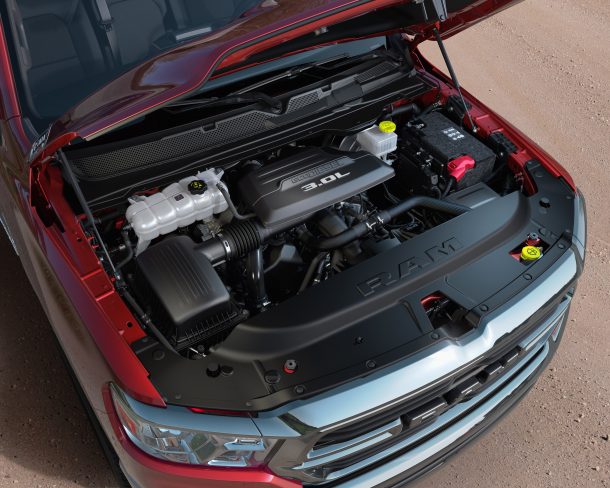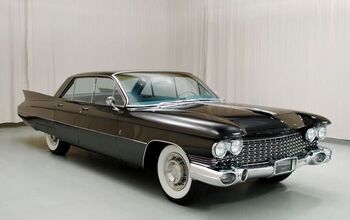EcoDiesel, Part II: Fiat Chrysler's New Light Duty Diesel Aims to Anger GM and Ford, Not the EPA

The domestic pickup torque wars have flared up again. Following a brief period of dormancy that came after General Motors’ 3.0-liter Duramax 3.0-liter inline-six topped Ford’s 3.0-liter Power Stroke V6 by 20 foot-pounds (460 vs. 440), Fiat Chrysler has arrived on the scene to declare itself king of the hill.
For the 2020 model year, FCA’s EcoDiesel 3.0-liter diesel V6 returns, this time without the baggage and after-the-fact modifications ordered by the federal government. It also pulls harder than its competition.
After a model-year hiatus, the EcoDiesel will reappear in the Ram 1500 fold for 2020, this time generating 260 horsepower and 480 lb-ft of torque. The previous-gen engine, which first appeared in 2014, made 240 hp and 420 lb-ft.
Despite endowing the 1500 line with fuel economy Ford and GM couldn’t match, that older version gave FCA quite a black eye. A scandal erupted in early 2017 over the automaker’s use of undeclared auxiliary emissions control devices, forcing FCA on the defensive. The EPA launched an investigation while the Department of Justice hit the automaker with a lawsuit, forcing it to settle for a sum far less than the penalty handed down to Volkswagen. While the automaker never admitted fault in the affair, it did clean up the engine’s act.
This new mill has undergone significant changes. Among them, a new water-cooled turbocharger with variable geometry turbine, redesigned cylinder head intake ports, an updated exhaust gas recirculation system, and redesigned fuel injector nozzles. FCA claims these and other changes boost the engine’s compression ratio to 16.5:1 (up from 16:1) and make for “superb fuel economy and minimal levels of noise, vibration and harshness.”
“The new Ram 1500 EcoDiesel is America’s most powerful half-ton diesel pickup, following up on Ram’s Heavy Duty torque leadership and achieving what no other manufacturer has, with up to 480 lb.-ft. of torque in a 3.0-liter engine,” said Ram boss Reid Bigland, who’s currently suing his employer, in a statement.
Fuel economy ratings for the new EcoDiesel pickup have not yet been released, though Ram hopes its efforts deliver another bragging right. Buyers will be able to pair the new EcoDiesel with Ram’s adjustable air suspension, further boosting economy of the fuel variety.
As it stands, there’s already two boasts — the aforementioned torque figure, and the engine’s ability to tow 12,560 pounds. The F-150’s max diesel tow rating is 11,400 pounds; the Silverado 1500’s is still unknown. Indeed, Ram can’t yet claim best-in-class towing with any certainty.
Interestingly, Ram plans to offer the new EcoDiesel not just on the second year of its new full-size pickups, but on 2019 versions of its older-generation 1500 Classic. All Ram 1500 trims can be had with a diesel, FCA claims, including the Rebel.
Pricing and fuel economy will land closer to the engine’s fourth-quarter on-sale date.
[Images: Fiat Chrysler Automobiles]

More by Steph Willems
Latest Car Reviews
Read moreLatest Product Reviews
Read moreRecent Comments
- SCE to AUX Fisker filed for reorganization in Austria - the end is near.https://insideevs.com/news/718875/fisker-reorganization-austria/
- MaintenanceCosts More or less an admission that the radar-only cars will never do anything that could reasonably be marketed as "Full Self-Driving."
- Bd2 The coolest true SUV on the market. Change my mind.
- VoGhost Fettle, racket, wade, throne -- what's going on with Matthew?
- Mcw I have only seen one on the road in Northern California, but I have to say I liked the appearance. Too bad.



































Comments
Join the conversation
1994 7.3 liter Powerstroke: 210 hp, 425 lb-ft.
Can it be modified to roll enough coal to cover the rear half of the bed in soot? ‘Cuz around here, that’s why people buy diesels.